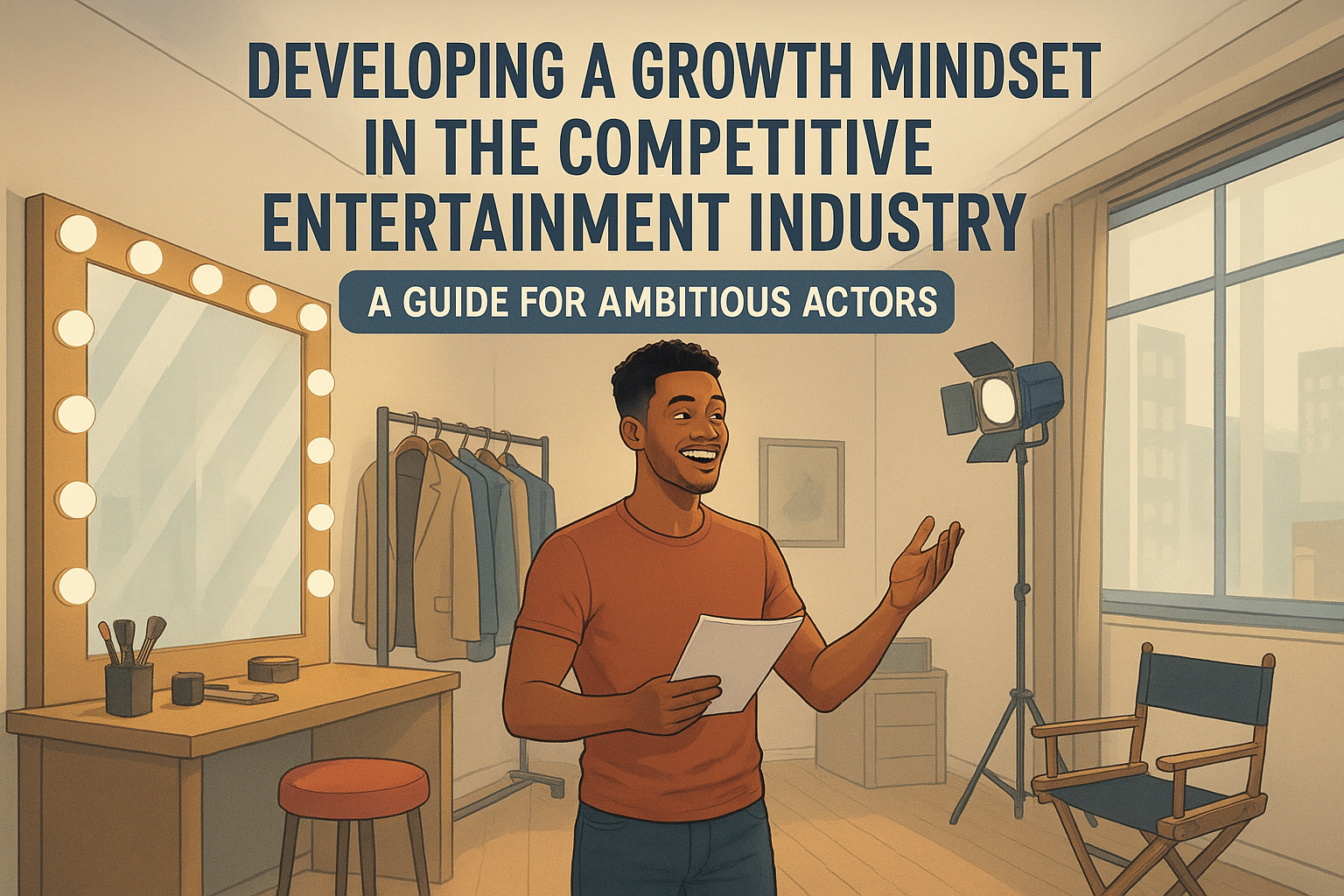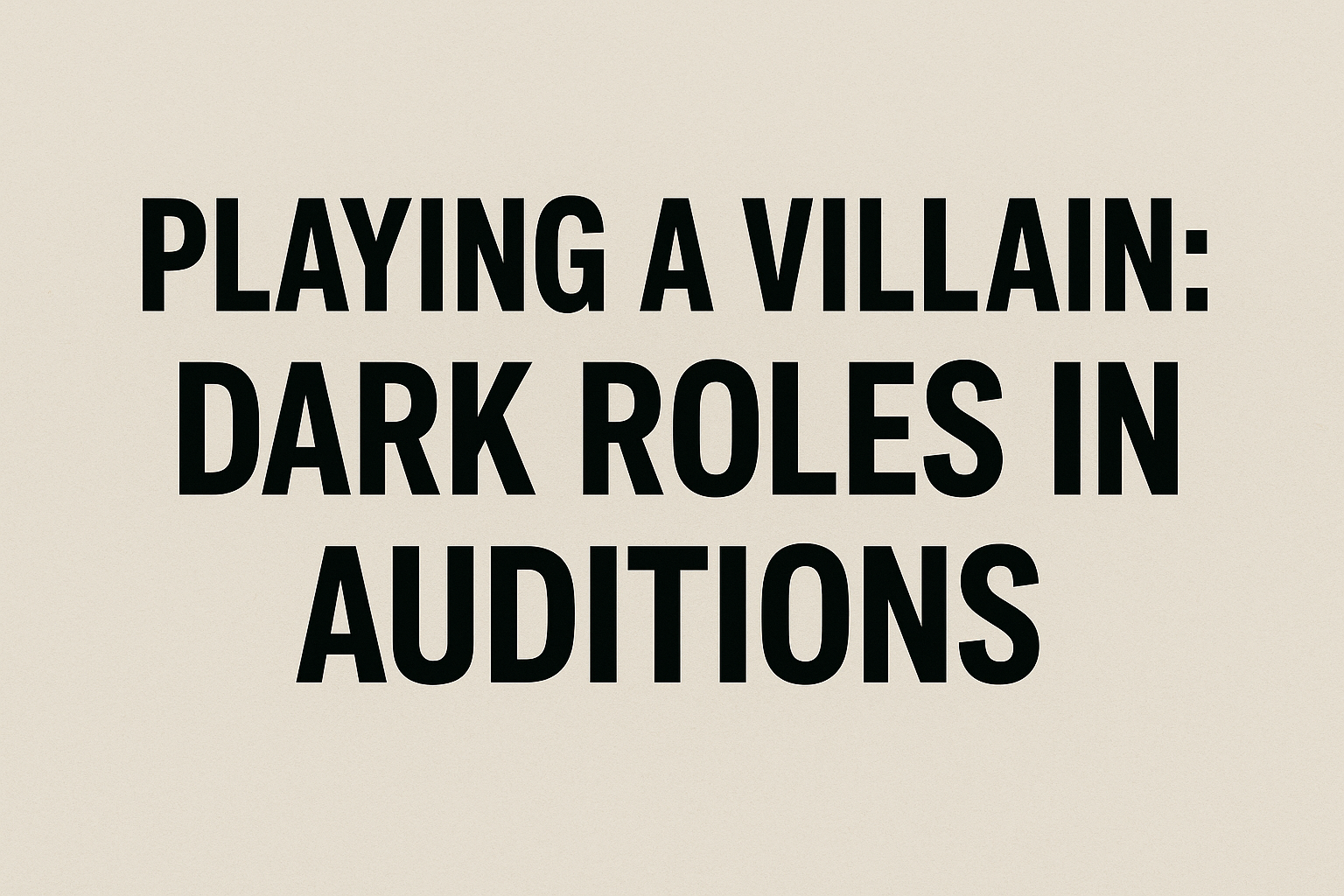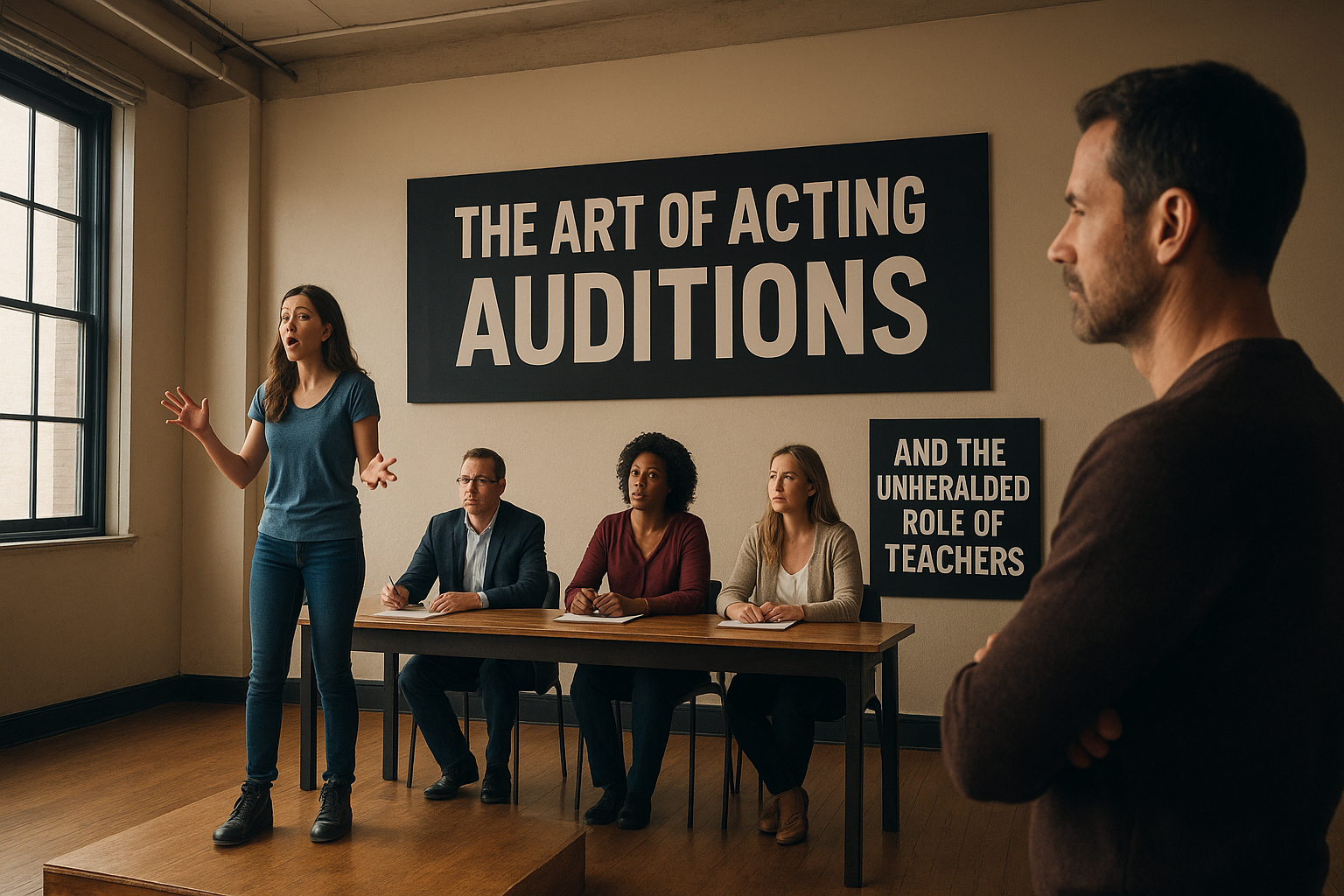
In the high-stakes, emotionally demanding world of acting, rejection is frequent, uncertainty is constant, and comparison can feel unavoidable. The entertainment industry is as competitive as it gets—and in such an environment, your mindset can make or break your journey. While talent, networking, and luck all play their part, there's one internal tool that can drastically shift your trajectory: a growth mindset.
But what exactly does that mean? And how can it assist actors not only to survive—but thrive—through a career full of ups and downs and detours?
What Is a Growth Mindset?
Growth mindset, a term coined by psychologist Dr. Carol Dweck, is the attitude that abilities and intelligence can be cultivated with time through effort, learning, and persistence. A fixed mindset, on the other hand, believes that talents are intrinsic, unchanging, and fixed—you either "have it" or you don't.
For actors, a growth mindset means:
Having a belief that you can hone your craft through regular training
Having feedback and rejection as a means to improvement
Thwarting challenges instead of being afraid of failing
Knowing success is a process, not a momentary achievement
Where comparison is rife and competition is intense in a profession, having a growth mindset can guard against your mental health, drive your motivation, and ultimately enable you to survive long enough to thrive.
Why a Growth Mindset is Important for Actors
Let's be real—acting isn't for the faint of heart. You will encounter:
Audition rejection after you felt certain you aced them
Parts that end up being played by a more experienced or well-connected actor
Self-doubt when you feel unnoticed or unvalued
In those moments, a fixed mindset whispers these lies:
"You're not good enough."
"You're just not talented."
"Others are born with it—you weren't."
A growth mindset, though, turns things around:
"This is an opportunity to learn."
"What can I do better next time?"
"Everyone begins somewhere."
That adjustment can be the matter of giving up versus going on.
How to Develop a Growth Mindset within a Competitive Field
Below are practical steps you can apply as an actor to develop a growth mindset:
1. Redefine Failure
Most actors view not getting a role as a personal failure. But is it?
Casting is subjective and not always in your hands. You're sometimes too tall, too young, the wrong "look," or just not what was in the director's mind creatively. That doesn't make you bad—it makes you not the best for this one.
Rewrite it: Every audition is rehearsal. Every "no" is a stepping stone to a "yes."
2. Ask for Feedback and Use It
Most actors avoid feedback because they fear criticism. But feedback—when given constructively—is precious. It makes you grow, identify blind spots, and improve your craft.
Seek out trusted coaches, directors, or peers:
"What did you pick up about my performance?"
"Is there something I can do better?"
"How did my decisions land with you?"
Tip: Don't make it personal. Feedback isn't about you—it's about your work.
3. Celebrate Effort, Not Just Outcomes
Rather than just celebrating bookings or callbacks, begin celebrating:
That you arrived at the audition with confidence
That you nailed your lines
That you took a bold, strong risk in your performance
Why it matters: This keeps you in process-over-perfection mode. The more you celebrate effort, the more motivated and resilient you'll be.
4. Have a "Beginner's Mind"
Even seasoned actors can benefit from returning to the fundamentals. The best artists are eternal students.
Take new classes. Try unfamiliar roles. Explore improv. Read plays and scripts regularly.
Growth mindset mantra: “There’s always more to learn.”
5. Watch and Learn from Others—Without Jealousy
It’s natural to compare yourself to actors who seem to be “making it.” But comparison often feeds a fixed mindset.
Instead of feeling envious, get curious:
What did they do differently?
What decisions did they make?
What can I learn from how they performed?
Take their success as motivation, not intimidation.
6. Substitue "I Can't" with "Not Yet"
The words we choose determine our mindset.
Instead of: "I'm not comfortable doing dramatic parts."
Say: "I haven't yet mastered doing dramatic parts."
Instead of: "I quickly can't memorize lines."
Say: "I'm focusing on developing my memorization ability.
The term "yet" is strong. It leaves the door open for development.
Mental Wellbeing and Mindset Are Intertwined
When your work in a business often seems connected to who you are, mindset is also directly connected to mental wellbeing. A growth mindset:
Lessens fear of perfectionism
Helps you recover from rejection
Promotes kindness towards yourself
Don't underestimate the power of journaling, meditation, affirmations, and taking breaks. You're not a machine. You're a human being—and your mind is your most valuable asset.
Keep Growing, Keep Going
The most successful actors didn't become successful because they never failed—they became successful because they never allowed failure to stop them. They learned, they adapted, and they showed up again. Again. And again.
A growth mindset makes every audition a chance, every criticism a learning experience, and every setback an opportunity to get better.
So, the next time you don't land the part, ask yourself:
What did I learn?
What can I improve on next time?
How am I growing from this?
Because in the end, it's not talent that makes you successful—it's the mindset that keeps you playing.
In the high-stakes, emotionally demanding world of acting, rejection is frequent, uncertainty is constant, and comparison can feel unavoidable. The entertainment industry is as competitive as it gets—and in such an environment, your mindset can make or break your journey. While talent, networking, and luck all play their part, there's one internal tool that can drastically shift your trajectory: a growth mindset.
But what exactly does that mean? And how can it assist actors not only to survive—but thrive—through a career full of ups and downs and detours?
What Is a Growth Mindset?
Growth mindset, a term coined by psychologist Dr. Carol Dweck, is the attitude that abilities and intelligence can be cultivated with time through effort, learning, and persistence. A fixed mindset, on the other hand, believes that talents are intrinsic, unchanging, and fixed—you either "have it" or you don't.
For actors, a growth mindset means:
Having a belief that you can hone your craft through regular training
Having feedback and rejection as a means to improvement
Thwarting challenges instead of being afraid of failing
Knowing success is a process, not a momentary achievement
Where comparison is rife and competition is intense in a profession, having a growth mindset can guard against your mental health, drive your motivation, and ultimately enable you to survive long enough to thrive.
Why a Growth Mindset is Important for Actors
Let's be real—acting isn't for the faint of heart. You will encounter:
Audition rejection after you felt certain you aced them
Parts that end up being played by a more experienced or well-connected actor
Self-doubt when you feel unnoticed or unvalued
In those moments, a fixed mindset whispers these lies:
"You're not good enough."
"You're just not talented."
"Others are born with it—you weren't."
A growth mindset, though, turns things around:
"This is an opportunity to learn."
"What can I do better next time?"
"Everyone begins somewhere."
That adjustment can be the matter of giving up versus going on.
How to Develop a Growth Mindset within a Competitive Field
Below are practical steps you can apply as an actor to develop a growth mindset:
1. Redefine Failure
Most actors view not getting a role as a personal failure. But is it?
Casting is subjective and not always in your hands. You're sometimes too tall, too young, the wrong "look," or just not what was in the director's mind creatively. That doesn't make you bad—it makes you not the best for this one.
Rewrite it: Every audition is rehearsal. Every "no" is a stepping stone to a "yes."
2. Ask for Feedback and Use It
Most actors avoid feedback because they fear criticism. But feedback—when given constructively—is precious. It makes you grow, identify blind spots, and improve your craft.
Seek out trusted coaches, directors, or peers:
"What did you pick up about my performance?"
"Is there something I can do better?"
"How did my decisions land with you?"
Tip: Don't make it personal. Feedback isn't about you—it's about your work.
3. Celebrate Effort, Not Just Outcomes
Rather than just celebrating bookings or callbacks, begin celebrating:
That you arrived at the audition with confidence
That you nailed your lines
That you took a bold, strong risk in your performance
Why it matters: This keeps you in process-over-perfection mode. The more you celebrate effort, the more motivated and resilient you'll be.
4. Have a "Beginner's Mind"
Even seasoned actors can benefit from returning to the fundamentals. The best artists are eternal students.
Take new classes. Try unfamiliar roles. Explore improv. Read plays and scripts regularly.
Growth mindset mantra: “There’s always more to learn.”
5. Watch and Learn from Others—Without Jealousy
It’s natural to compare yourself to actors who seem to be “making it.” But comparison often feeds a fixed mindset.
Instead of feeling envious, get curious:
What did they do differently?
What decisions did they make?
What can I learn from how they performed?
Take their success as motivation, not intimidation.
6. Substitue "I Can't" with "Not Yet"
The words we choose determine our mindset.
Instead of: "I'm not comfortable doing dramatic parts."
Say: "I haven't yet mastered doing dramatic parts."
Instead of: "I quickly can't memorize lines."
Say: "I'm focusing on developing my memorization ability.
The term "yet" is strong. It leaves the door open for development.
Mental Wellbeing and Mindset Are Intertwined
When your work in a business often seems connected to who you are, mindset is also directly connected to mental wellbeing. A growth mindset:
Lessens fear of perfectionism
Helps you recover from rejection
Promotes kindness towards yourself
Don't underestimate the power of journaling, meditation, affirmations, and taking breaks. You're not a machine. You're a human being—and your mind is your most valuable asset.
Keep Growing, Keep Going
The most successful actors didn't become successful because they never failed—they became successful because they never allowed failure to stop them. They learned, they adapted, and they showed up again. Again. And again.
A growth mindset makes every audition a chance, every criticism a learning experience, and every setback an opportunity to get better.
So, the next time you don't land the part, ask yourself:
What did I learn?
What can I improve on next time?
How am I growing from this?
Because in the end, it's not talent that makes you successful—it's the mindset that keeps you playing.
Acting may be an art, but in the world of professional performance, it begins long before the cameras roll or the stage lights shine. It begins with the audition — the often nerve-wracking, unpredictable process that determines whether an actor even gets the chance to perform. For aspiring actors, understanding the relationship between auditioning and acting is not just important — it's essential. One feeds into the other, and together, they shape an actor’s growth, resilience, and ultimate success.
When it comes to acting, playing a villain is considered a challenge and a golden chance. Villains are multilayered, multi-dimensional, and probably the most remembered characters in a narrative. Be it old Bollywood films such as Gabbar Singh from Sholay or OTT villains such as Guruji from Sacred Games, dark roles determine an actor's fate. But auditioning for a villain is an altogether different. It needs a firm grasp of psychology, body language, and emotional regulation. If you're a newbie or a seasoned actor wanting to master your craft, this blog will walk you through all that you need to know on how to audition for villainous roles.
There is a moment every actor fears: the casting director places a script in your hands you've never laid eyes on before and says, "Take a minute, and when you're ready, we'll begin. Welcome to the cold read — perhaps the most unpredictable, yet vital portion of an actor's career. Whether you're auditioning for theater, television, or voiceover, cold reading is the skill that can break or make your chance at a role. But the good news is this: like every other craft, it can be practiced, honed, and eventually mastered. In this post, we will analyze what cold reading actually is, why it's important, and how you can transform a cold script into a warm, breathing performance.
In showbiz, auditions for acting are the initial and most often essential step toward a dream. For aspiring actors, an audition is not simply reading lines or acting in front of a casting director—it's a moment of exposure, innovation, and bravery. But behind every assured performance are years of education, instruction, and mentoring. And on Teachers' Day, it is only appropriate that we acknowledge the unseen architects of every actor's journey—their teachers.
Lights Camera Audition!
Don't miss out on the latest updates, audition calls, and exclusive tips to elevate your talent. Subscribe to our newsletter and stay inspired on your journey to success!







